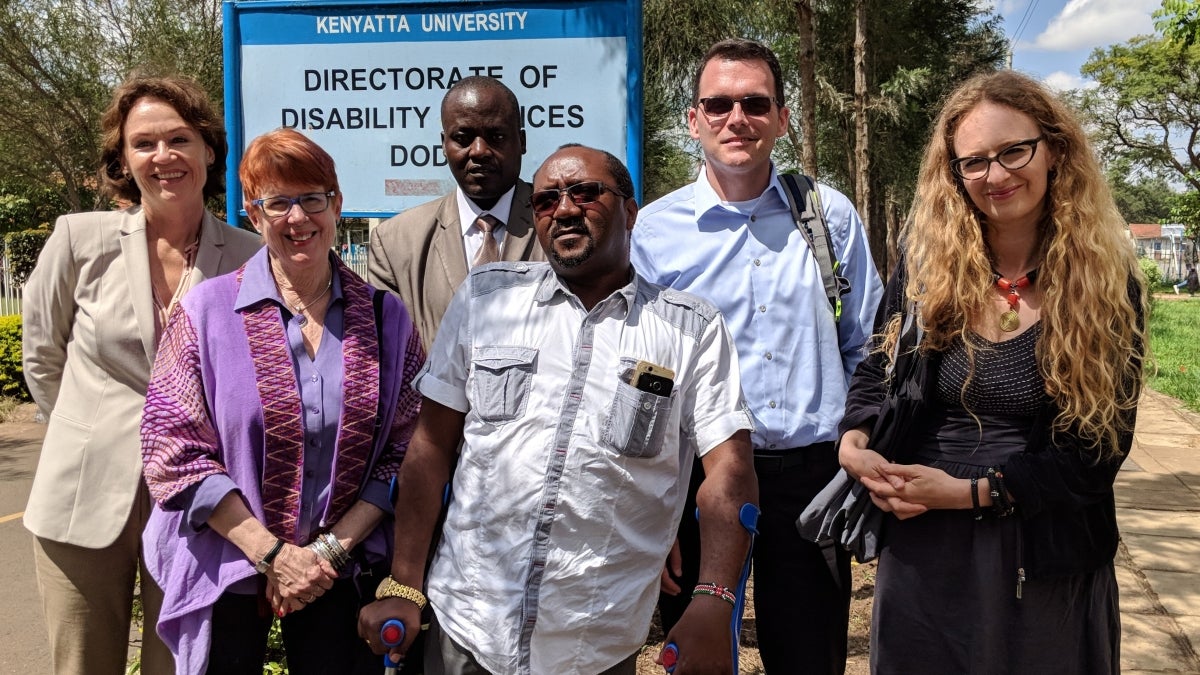ASU team seeks collaboration with Kenyan universities

A team from ASU meeting with representatives from Kenyatta University.
In late May, Professor Nina Berman of the School of International Letters and Cultures, Professor Beth Blue Swadener of the School of Social Transformation and Lecturer Paul Quinn, director of the American Sign Language program in the College of Health Solutions, met with representatives of Kenyan universities to explore various areas of collaboration. Flora Farago, a PhD alumni from the T. Denny Sanford School of Social and Family Dynamics and assistant professor at Stephen F. Austin State University in Texas, also joined the group.
At Kenyatta University, the ASU team met with colleagues from early childhood education, special-needs education, engineering, international programs and collaborations, and the Office of Disability Services. Kenyatta University (KU) is a public research university just outside of Nairobi and is one of the top universities in Kenya, ranked second among all public and private universities in the country.
The group also visited the Thika location of Mount Kenya University — a highly ranked private university. The ASU team met with colleagues and representatives from special needs, education and the Quality Assurance & Linkages Office.
The conversations on campus were followed by a visit to Joytown School for the Physically Disabled.
Swadener and Farago also had meetings at Moi University in Eldoret.
Quinn visited several primary schools for the deaf in the region, both residential and mainstreamed format. He also went to see vocational training sites for young adults who are deaf. During those visits, he identified a significant need for speech pathology services. This area promises great potential for collaborative efforts between the speech and hearing science academic program and Kenyatta University’s communication disorders department.
The goal of the visits was to establish collaboration agreements with ASU that create the framework for easier facilitation of faculty exchanges, student exchanges, joint research collaborations, and study abroad programs, among other activities.
Arizona and Kenya share features and concerns in many areas, among them issues related to climate change, water, drought, mining, land ownership, indigenous populations, cultural and linguistic diversity, tourism, border insecurity, drug trafficking and poverty. An abundance of collaborative and comparative research projects and exchanges involving Arizona and Kenya is foreseeable.
More Health and medicine
Is ‘U-shaped happiness’ universal?
A theory that’s been around for more than a decade describes a person’s subjective well-being — or “happiness” — as having a U-…
College of Health Solutions medical nutrition student aims to give back to her Navajo community
As Miss Navajo Nation, Amy N. Begaye worked to improve lives in her community by raising awareness about STEM education and…

Linguistics work could improve doctor-patient communications in Philippines, beyond
When Peter Torres traveled to Mapúa University in the Philippines over the summer, he was shocked to see a billboard promoting…